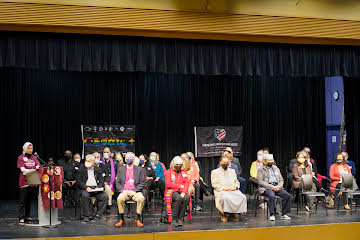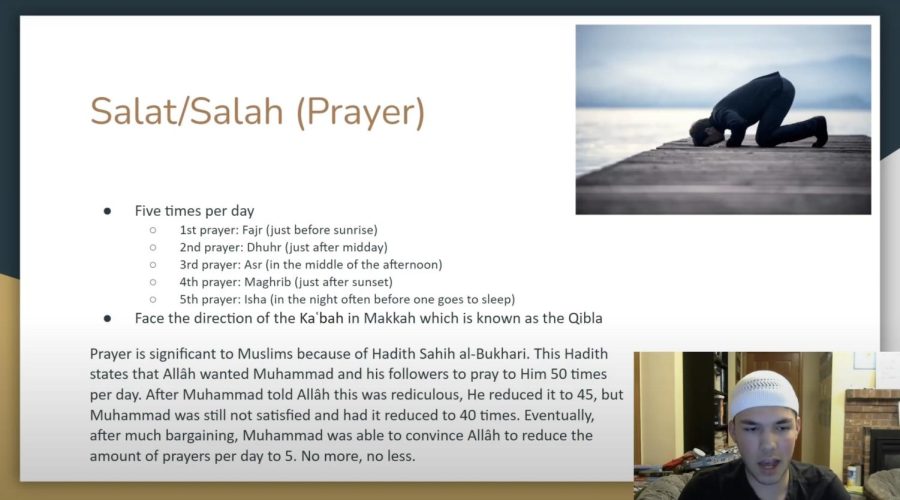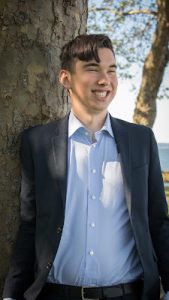The World Religions Club: All are welcome
Looking for a club covering the various religions of the world in-depth? Look no further.
The World Religions Club, founded with the aim of exploring the various branches of each religion instead of a general overview of their beliefs, held its first meeting on Feb. 2 in Weber Hall and has currently covered Sunni and Shia Islam and Sufism, while planning to study the history and theology of Ahmadiyya later this month.
The club was founded by juniors Xavier Nazzal, Rylan Jordan, Noah Wilson, and Balin Kanno with the express purpose of explaining the beliefs of the most influential and lesser known branches of each world religion and religious families (e.g. Dharmic, Abrahamic, etc.), hosting formal debates on Christian theology, and maybe interfaith events.
Nazzal hopes to eventually host an interfaith event revolving around the four major monotheistic religions of the world, Christianity, Islam, Sikhism, and Judaism.
“Noah and I had the privilege of spending Halloween at an interfaith event that the Islamic Center of Tacoma kindly invited us to attend,” said Nazzal, “Afterwards, I got to interview some extraordinary people from the mosque, who were among the nicest and most polite people I have met in my life, no exaggeration required, and I hope to emulate at least a fraction of the greatness of the interfaith gathering. I also came across a video on YouTube in which a Rabbi, an Imam, and a Christian leader were asked to converse about their faiths. I think hosting an interfaith event between an Imam, a Rabbi, a priest, and a Sikh religious leader would show popular monotheistic religion in its fullness.”

Picture courtesy of Alaa Alshaibani
Wilson, a founder of the club and a syncretic religious practitioner who takes practices and beliefs from Christianity and Islam has said the following about the club and his unique views of religion:
“I love having this club to discuss not only my own views on religion, but also many others. I love seeing how religion intertwines with history and politics and I am so glad that we are covering all of such in our meetings! As previously stated, the religious practices I partake in are Syncretic and come primarily from Christian doctrine and Islamic doctrine. It really warms my heart to see so many people at our school who are willing to learn about my own and many others’ experiences with religion. When we originally came up with the idea for this club, I remember it being intended as a religious safe space for all students at our school to talk about their beliefs. To me, being religious doesn’t mean you have to worship the God portrayed by the Church or by any institution but, rather, having faith in humanity. It is for this reason and the very heart of this club that I believe any student at Bellarmine, Catholic or not, Christian or not, can be the religious grad at grad that we so strive to become.”
Wilson has demonstrated how Muslims pray at the beginning of the third club meeting on Sufism.

Source: The GodCast (channel on YouTube)
Nazzal, a founder of the club alongside Jordan, Wilson, and Kanno, hopes to introduce formal debates sometime this month or early next month, saying:
“There are a lot of things that are assumed true about religion. People basically assume that the Trinity is taught in the Bible when it is not. I hope to debate with Levi in an attempt to get to the bottom of whether something as seemingly fundamental to the Christian faith, the triune God, holds any Biblical merit. Additionally, the four-point hermeneutics system of the Middle Ages is forgotten, largely as a result of Protestantism and also because of Catholicism’s changes. It may be high time to attempt to explore which Biblical interpretation makes the most sense and if they are compatible with one another, specifically historical versus allegorical.”

Source: The GodCast (channel on YouTube)
Jordan, a club founder, hopes to transition from lecture-based meetings to a model that a majority of the club members have voted on, saying:
“It is important to incorporate free discussion into club meetings so that they don’t feel like a lecture you would have to endure at school. What free discussion means is trying to have as much audience participation and input as possible.”
In an attempt to gauge club involvement, Nazzal sent out a survey on preferred religions for study resulting in the club members choosing the Druze religion, Judaism, and how to combat cults as topics for planned future meetings.

Source: Xavier Nazzal
The World Religions Club plans to meet on Friday, February 25 with the aim of exploring one of the newest branches of Islam, Ahmadiyya, which broke off from conventional Islam in 1889 when its founder declared himself the Muslim messiah or Mahdi.
The World Religion Club invites you to join them every Wednesday at 2:45 in teacher Joe Miller’s room, Weber-1.

Xavier Nazzal is a senior who serves as the Executive Online Editor for the Lion Journalism 2022 - 2023 school year. Among other things, Nazzal participates...
